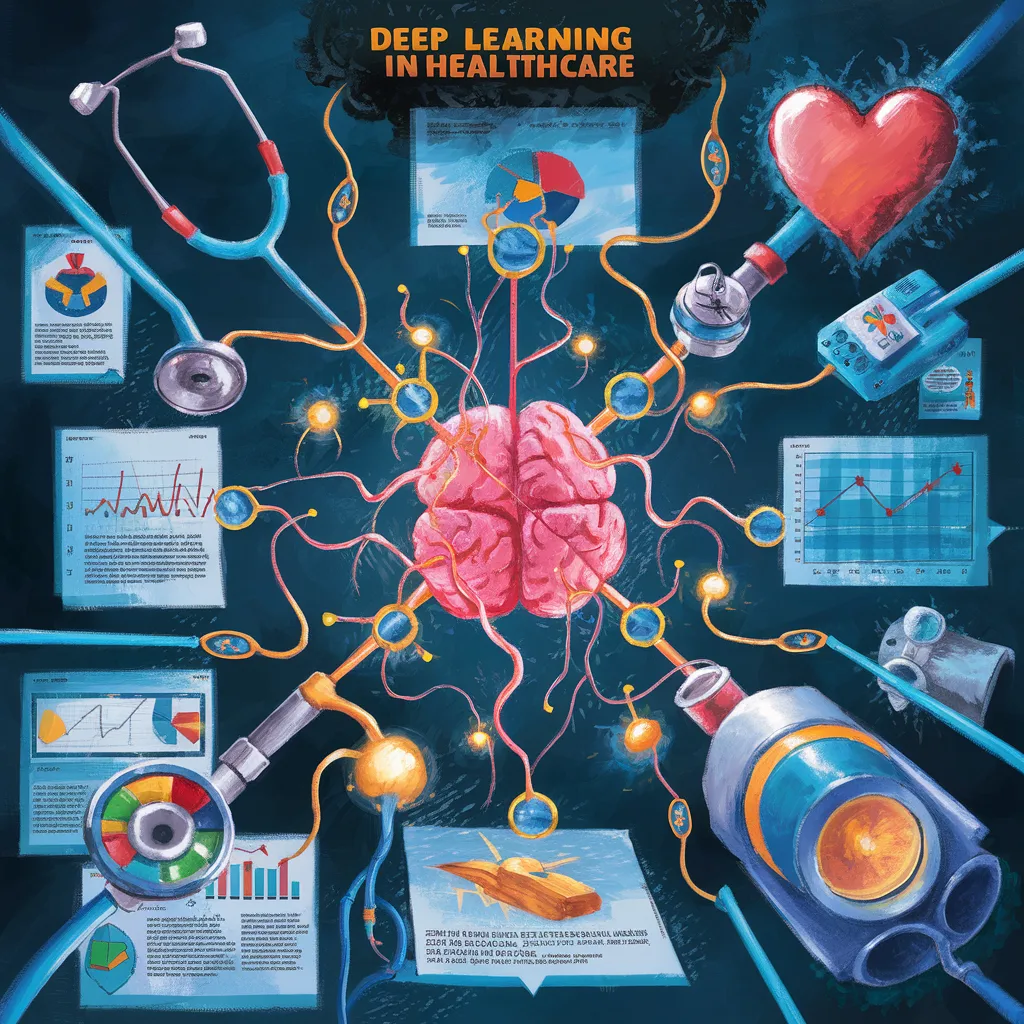[[{“value”:”
Biomedical data is increasingly complex, high-dimensional, and heterogeneous, encompassing sources such as electronic health records (EHRs), imaging, -omics data, sensors, and text. Traditional data mining and statistical methods must improve with this complexity, often requiring extensive feature engineering and domain expertise to extract meaningful insights. Recent advancements in deep learning offer a transformative approach by enabling end-to-end learning models that can directly process raw biomedical data. These models, known for their success in fields like computer vision and NL processing, can revolutionize healthcare by facilitating the translation of vast biomedical data into actionable health outcomes. However, challenges remain, including the need for models that are interpretable by healthcare professionals and adaptable to the unique characteristics of medical data, such as its sparsity, heterogeneity, and temporal dependencies.
Despite the promise of deep learning in healthcare, its adoption has been limited due to several challenges. These include the high-dimensional nature of biomedical data, inconsistencies across different medical ontologies, and the need for comprehensive integration into clinical workflows. Nevertheless, ongoing efforts and planned applications, such as those by Google DeepMind and Enlitic, indicate a growing interest in leveraging deep learning for tasks like disease detection and predictive analysis. The future of healthcare lies in developing deep learning models that perform robustly and offer interpretability and ease of use for medical practitioners, thereby advancing precision medicine and improving patient outcomes.
Deep Learning in Medical Imaging:
Deep learning, particularly through CNNs, has significantly advanced computer vision in medical imaging. CNNs excel in tasks like object classification, detection, and segmentation, achieving human-level accuracy in diagnosing conditions from radiographs, dermatology images, retinal scans, and more. These models, often trained on large datasets and fine-tuned for specific medical tasks, assist physicians by flagging potential issues in images and providing second opinions. Despite their success, challenges remain, such as the need for large labeled datasets and incorporating clinical context for more accurate diagnostics.
Advancements in Natural Language Processing for Healthcare:
NLP leverages deep learning to analyze and understand text and speech, significantly impacting fields such as machine translation, text generation, and image captioning. RNNs are pivotal in this domain because they can process sequential data effectively. In healthcare, NLP is instrumental in managing EHRs, which compile extensive medical data across patient histories. Deep learning models can use this data to answer complex medical questions, enhance diagnostic accuracy, and predict patient outcomes. Techniques like supervised and unsupervised learning and auto-encoders help extract meaningful insights from the vast amounts of structured and unstructured data in EHRs.
Future developments in NLP for healthcare include creating clinical voice assistants to transcribe patient visits accurately reducing physician burnout by minimizing time spent on documentation. These voice assistants could use RNN-based language translation to convert conversations directly into EHR entries. Another focus area is combining structured and unstructured data using large-scale RNNs to make comprehensive predictions about patient health, such as mortality risk and length of hospital stay. As these technologies evolve, they promise to revolutionize medical practice by providing timely, data-driven insights and enhancing the overall quality of care.
Deep Learning Applications in Healthcare Domains:
Deep learning has revolutionized healthcare across various domains, notably clinical imaging, EHRs, genomics, and mobile health monitoring. In clinical imaging, CNNs analyze MRI scans for Alzheimer’s disease prediction and segment knee cartilage for osteoarthritis risk assessment. In EHR analysis, RNNs predict diseases from patient records, while deep patient representations aid in risk prediction. Genomic studies leverage CNNs for DNA sequence analysis. In mobile health, CNNs and RNNs detect gait freezing in Parkinson’s patients and predict energy expenditure from wearable sensor data. These applications demonstrate deep learning’s potential in advancing healthcare diagnostics and monitoring.
Challenges and Opportunities in Applying Deep Learning to Healthcare:
Despite the successes in applying deep learning to healthcare, several challenges still need to be addressed, including data volume, quality, temporality, domain complexity, and interpretability. These challenges present opportunities for future research, such as enriching features, federated inference, ensuring model privacy, incorporating expert knowledge, temporal modeling, and making models interpretable. Deep learning offers powerful methods for analyzing healthcare data and can pave the way for predictive healthcare systems that integrate diverse data sources, support clinicians, and advance medical research. Deep learning could revolutionize healthcare by scaling to large datasets and providing comprehensive patient representations.
Sources:
https://www.nature.com/articles/s41591-018-0316-z
https://www.ncbi.nlm.nih.gov/pmc/articles/PMC6455466/
The post Deep Learning in Healthcare: Challenges, Applications, and Future Directions appeared first on MarkTechPost.
“}]] [[{“value”:”Biomedical data is increasingly complex, high-dimensional, and heterogeneous, encompassing sources such as electronic health records (EHRs), imaging, -omics data, sensors, and text. Traditional data mining and statistical methods must improve with this complexity, often requiring extensive feature engineering and domain expertise to extract meaningful insights. Recent advancements in deep learning offer a transformative approach by
The post Deep Learning in Healthcare: Challenges, Applications, and Future Directions appeared first on MarkTechPost.”}]] Read More AI Shorts, Applications, Artificial Intelligence, Editors Pick, Staff, Tech News, Technology
